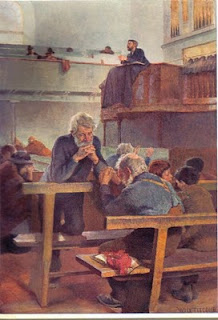Every person has a name. Everyone has a name that they would prefer to be called by. Some of us also have names that others give to us, such as a nickname. We may or may not like the name or names people call us, but we cannot control how others refer to us.
Like people, every identifiable movement of God has a name.
The early followers of Jesus chose a name for themselves. They described themselves as followers of The Way (
Acts 9:2,
Acts 22:4,
Acts 24:14). This is the name the believers preferred.
But the name that others gave them was first used in Antioch.
Acts 11:26 says “The disciples were called Christians first at Antioch”. The word
Christian means "Christ followers" or "those of the household of Christ". It is used three times in the New Testament. In
Acts 26:28 ‘Agrippa said to Paul, “Do you think that in such a short time you can persuade me to be a Christian?”‘ Peter observes “However, if you suffer as a Christian, do not be ashamed, but praise God that you bear that name.” (
1Peter 4:16) For the early believers, being known as a Christian was not easy.
The Jewish religion was legally protected by Rome. Being known as Christians meant that they risked losing that protection. They were not just a sect within Judaism. They had much in common with the Jews but they appealed to non Jews as well.
It is quite possible that the name “Christian” was a term of derision when first used, but in the providence of God it was the name that stuck.

The Primitive Methodists chose their own name on Feb 13, 1812. They decided on “
The Society of the Primitive Methodists”. But like the early Christians they had another name not of their own choosing.
For the pioneer Primitive Methodists their “Antioch” was the village of
Belper in Derbyshire in 1814. It was there that they were first called “
Ranters”. It was definitely not a name they would have chosen for themselves.
In fact the name
Ranter was most often used as a term of derision, scorn and abuse. Many a young convert experienced verbal assault as their persecutors and opponents mockingly called them a
Ranter.However, there was an upside to the name. When word got round that a
Ranter preacher was coming to town, a curious and sometimes hostile crowd would gather. It meant that you could not ignore the
Ranters. You were either for them or against them.
Ranter preachers often faced a barrage of eggs, rotting vegetables, mud and worse as they preached in the open air. Violence and opposition was part of the package for the early pioneers.
The name
Ranter was providentially used of God.
So … what’s in a name? A great deal, but it may not be the one we would choose!
Related posts
1.
Why 'Primitive' Methodism?2.
How the Primitive Methodists got their name3.
What's in a name?4.
The Ranters are coming5.
Opposing the work of God is a risky business











